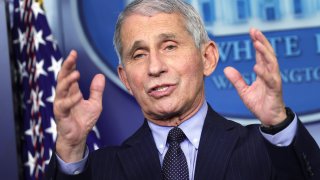
One year of the Covid pandemic has been a learning experience for everyone, even White House chief medical advisor, Dr. Anthony Fauci.
For one thing, the nation's leading expert on infectious disease said he's learned that it's important to admit when you don't know the answer to something.
"I've got to tell you, the reason I get more humble as the years go by [is] because I realized how much I don't know," Fauci told University of Chicago dean Kate Baicker on the March 4 episode of the "Big Brains" podcast.
When SARS-Cov-2 emerged last year, it was a novel virus, so there was no blueprint for how to handle the outbreak. Scientists were discovering things about the virus in real time as it spread across the globe.
Get Philly local news, weather forecasts, sports and entertainment stories to your inbox. Sign up for NBC Philadelphia newsletters.
"When you're dealing with virgin territory, you have to make adjustments, be flexible enough and humble enough to know that you may need to essentially, modify what you've said before," Fauci said.
One thing Fauci thought he "did know a lot about" at the start of the pandemic was how to get vaccines to minority populations. But he had eye-opening experiences along the way. For example, how can people without computer access get a vaccine appointment? And how can you reach people in pharmacy deserts?
"All of those things that you've really got to realize that are there, and you say, 'Yeah, I should have really figured that out,'" he said on "Big Brains."
Money Report
Fauci, who has been the director of the National Institute of Allergy and Infectious Disease since 1984, said that admitting what you don't know requires humility.
To that end, Fauci said that leading with scientific data, not guesses, has been key to his strategy during the pandemic.
"When you don't have the data, make it very explicit so that no one gets any misinterpretation that you are saying something that is possible, maybe likely, but you do not know for sure," he said.
At times, the political climate and "divisiveness in society" made it challenging to communicate with the public about certain safety measures like wearing masks and reopening businesses, Fauci during an interview with NPR on March 9.
"It was extremely frustrating and, quite frankly, painful to try and get a public health message out that would be lifesaving," he said.
During a virtual homecoming event for Cornell University back in October, Fauci gave this sage advice for young physicians who may have to communicate with the public: "The goal in communicating is not to show everybody how smart you are," he said. "The goal in communicating is to have people understand what you're talking about."
Check out: The best credit cards for building credit of 2021
Don't miss: Experts say Covid could become endemic — here’s what that means for you






